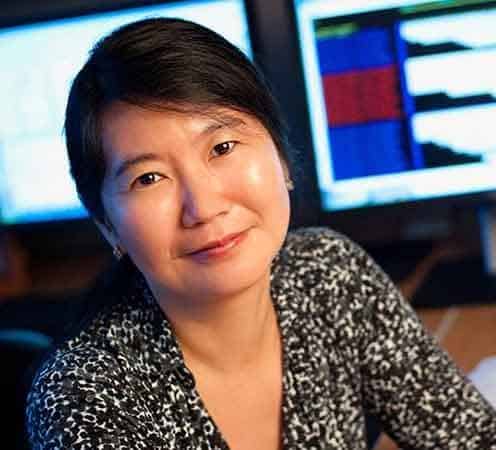Only by joining our heads together across multiple institutions can we make advancements in a cure.
Jinghui Zhang, PhD
Osteosarcoma contains the highest number of structural genetic rearrangements across pediatric and adult cancers.
For Jinghui Zhang, PhD, a computational biologist and renowned osteosarcoma researcher at St. Jude Children’s Research Hospital, this presents an exciting and worthy challenge.
“Osteosarcoma is fascinating to me,” says Dr. Zhang, who is also chair of the Department of Computational Biology and the St. Jude Endowed Chair in Bioinformatics at St. Jude. “It’s an area I feel very passionate about.”
So passionate that, in 2020, she joined the Osteosarcoma Institute as its newest strategic advisory board member. In this role, she collaborates with other OSI board members and researchers, advising on projects that will help advance the future or osteosarcoma treatment.

“It is a rare opportunity to interact with this rare disease,” she says. “We are all on the same mission of curing pediatric cancer. This provides me with a unique opportunity to engage with fellow scientists as well as the families with kids who are lost to this deadly disease. By getting involved in the scientific board of OSI, I can help advise on future research that can improve the outcome of osteosarcoma.”
A Changing Focus
For the majority of her distinguished career, Dr. Zhang’s focus has been on cancer epigenetics, the study of how our behaviors and environment can cause changes that affect the way our genes work. When she joined St. Jude in 2010, her research shifted to understanding the genetic origin of pediatric cancers, like osteosarcoma.
Part of this important work involves leading a research group that is responsible for analyzing next-generation sequencing data that has been generated from the St. Jude Children’s Research Hospital – Washington University Pediatric Cancer Genome Project (PCGP). This work has helped deepen experts’ understanding of high-risk leukemia, brain and solid tumors on a global scale.
Dr. Zhang also paved the way in uncovering major differences in the genomic landscape of pediatric versus adult cancer. This was done when she led the first pan-cancer analysis of the Therapeutically Applicable Research to Generate Effective Treatment (TARGET) initiative of the National Cancer Institute (NCI).
Early on in her career, Dr. Zhang led the genetic variation analysis of the first assembled human genome.
“Development of visualization tools for viewing integrative genomic data is another key interest, as these tools are indispensable for gaining an understanding of the experimental data,” she says, “and for reviewing the accuracy of the computational results obtained from the astronomical volume of the genomic data generated with the current technology.”
Today, she has her hand in several key areas of research, including osteosarcoma immunotherapy treatment options. According to Dr. Zhang, when you have a complex genome like osteosarcoma, the DNA changes and the tumors are more eligible for applying immunotherapy, because you can have new antigens being recognized only in the tumor cell, not in the normal cells.
“The landscape for osteosarcoma treatment is changing,” she says. “I suspect that because of osteosarcoma’s unusual genome arrangement, there may be some hidden gems there that can make it susceptible for some new type of treatment. So, we’re exploring how some patients might become eligible for immunotherapy.”
This is why collaboration among researchers from different institutions is so key, she adds.
“This way of sharing data is so valuable because we can use the existing data to do one type of discovery, but as therapeutic options open up, you can use the same data set to explore other avenues for treatment.”
Read more stories about the people powering OSI in The Frontline, our monthly newsletter. Click here to subscribe.
